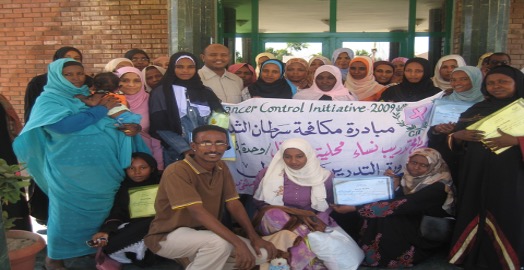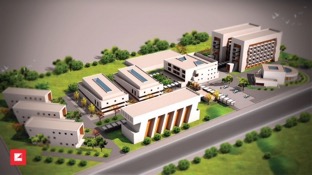
Cancer in Africans usually develops at young age and at an advanced stage which leads to a poor prognosis. Sadly, this is the case for cancer diseases known to be preventable or curable. A number of factors contribute to grave outcomes including:
Unfortunately, there is not much evidence that African countries are prepared to address this growing cancer burden.
The lack of cancer research, awareness, and policies will have inevitable and devastating impact on the African economy.
Dr. Mohammed successfully helps address these problems by:
Dr. Mohammed’s efforts have resulted in a reduced cancer burden by:

Dr. Mohammed diligently worked over the years with two community partners: The African Organization for Research and Training in Cancer (AORTIC) and the Gezira University Cancer Center in Sudan. Together, they reactivated AORTIC, increased its membership, and expanded its outreach programs. The organization currently has membership spanning all continents, with training and outreach programs that increase its considerable impact on cancer control in Africa.
Dr. Mohammed’s innovative breast cancer screening approach is helping save lives. With the help of the Cancer Center at Gezira University, a culturally sensitive system to screen for breast abnormalities was used in rural areas of Sudan where no mammograms machines are available or affordable.
The study used young women volunteers from the village to screen other women in the same town for breast abnormalities.
Thirty-five local female volunteers from 29 villages were trained about cancer and the need to detect it early.
The volunteers were taught how to perform a breast self-examination and what normal and abnormal breasts look like. The trainees screened 10,309 women for breast abnormalities in 29 villages.
During the first year, this approach helped detect early-stage breast cancer in 35 women who were open to treatment, which extended their lives.
The study was published in Lancet Oncology and was the topic of their April 2013 podcast.
The approach shows that a screening program using local volunteers can increase the detection of breast cancer in asymptomatic women in low-income, rural communities and save women's lives.
The awareness campaigns and training Dr. Mohammed developed provided a basis for the government of Sudan's studies using professional students during their summer vacation or midwives to screen women for breast and cervical cancers in rural areas of Sudan. It also provided a basis for a Malawi study replicating this approach by Gutnik et al. 2016.
Cancer is not the only disparity between developing and developed countries. There are also disparities in:
Significant advances in molecular biology, genomic technology, proteomics, metabolomics, and imaging techniques have contributed to improved effectiveness in drug development, molecular diagnostic, and personalized medicine in high-income countries (HIC).
Meanwhile, in Sub-Saharan Africa (SSA), research in disciplines such as epidemiology and case-control studies dominate the research literature. Although these studies are an essential contribution, they do not provide enough knowledge about all aspects of cancer for effective cancer control and treatment.
Basic and clinical research is mainly performed in HIC on mostly Caucasian populations and is then generalized to SSA patients. This approach does not consider differences in tumor biology, its interaction with the environmental and social factors, or the health system status.
The "one shoe-fits-all" approach may not work globally.
Cancer research in an indigenous African population and their tribal composition provides unique insight into cancer causes, prevention, and treatments specific to the African continent.
Dr. Mohammed is active in establishing basic cancer research in Africa. For more information watch this video published by ecancer and this video from Nature Journal.
The first African basic cancer research conference is planned for April 2022.

Djibouti, Eritrea, Ethiopia, Kenya, Somalia, South Sudan, Sudan, and Uganda are collectively known as the Intergovernmental Authority on Development (IGAD) region. Notable progress has been made in recent years in terms of national governance and social reforms among IGAD member nations, but challenges to the health and development of its populations remain in the forms of:
Cancer rates are rising across all IGAD nations. Cancer consistently ranks among the top three leading causes of mortality. The IGAD authority established a $250 million Regional Comprehensive Cancer Center in Addis Ababa. It is a hub for cancer research, training, and treatment for the entire region.
Dr. Mohammed planned, designed, recruited, and execute cancer research plans from basic, translational, clinical, and population research, including staffing and equipment. She currently chairs the research committee.